The recent rocket attack on Camp Liberty – the transient settlement facility of the terrorist Mojahedin-e Khalq 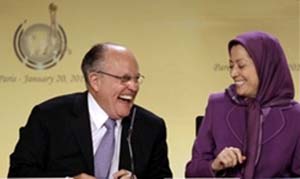 Organization in Iraq – unveiled the deep differences between the terrorist group and its American and European lobbyists.
Organization in Iraq – unveiled the deep differences between the terrorist group and its American and European lobbyists.
According to a report by Didehban center, pro-MKO lobbyists, who are mostly retired European and American politicians, have recently concluded that the criminal activities of the MKO (also known as the MEK, PMOI and NCR) will definitely prove costly for them.
They have recently increased their criticism about the "irresponsible" remarks of MKO’s ringleader, Maryam Rajavi, and the negative impacts of her remarks.
These lobbyists have realized that MKO ringleaders want to massacre the group’s members as they see such bloodshed as the only way to guarantee their longer stay in Iraq, while their lobbyists such as former New York mayor Rudy Giuliani have asked for the transfer of the MKO members to the US, said the Didehban report.
In Washington on Saturday, at a convention of Iranian-Americans, Giuliani called on the United States to take in the camp residents.
"These people can all be removed within hours," Giuliani said. "Planes can be sent immediately. They can be here within a day. We have done far more difficult things than that. It’s only about 3,000 people."
The report came after some media reports alleged that Katyusha rockets fired on the Camp Liberty have killed five members of the MKO. About 40 members of the terrorist group were reportedly wounded in Saturday’s attack, along with three Iraqi policemen, said the reports.
Meantime, a senior Iraqi lawmaker said that the recent rocket attack on Camp Liberty was a move to convince Iraq to allow the MKO to return to Camp Ashraf, but such actions are futile the grouplet’s return to its main training camp is impossible.
"Attack on the MKO aimed to rally the support of the international community’s public opinion for the MKO’s return to the Diyala province and Camp Ashraf," Abdullah al-Naeli said on Wednesday.
"But returning the MKO’s members to their previous position is not possible, specially given the fact that Diyala residents spent much efforts to expel them from their province," Naeli was quoted by Ashraf News as saying.
The Iraqi lawmaker added that the Baghdad government is seriously investigating the attack to find out the realities.
Mujahedin Khalq Declining
France expressed support over transferring members of the Mojahedin-e Khalq Organization outside Iraq, underlining its readiness to take part in coordination with the UN High Commissioner for Refugees (UNHCR).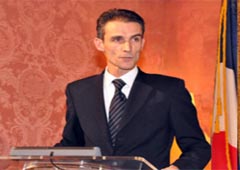
Iranian Fars news agency quoted French Foreign Ministry Spokesman Philippe Lalliot as saying that his country supports the UN plan to move the MKO to a third country.
Head of an Iraqi human rights group had said that Iraq seeks to try in absentia the members of the Mojahedin-e Khalq Organization (MKO, also known as the MEK, NCR and PMOI) in Iraq.
He said the people of Tuz Khurmato, who are victims of the MKO and the trial is going to be held in their city, expressed happiness and satisfaction over the issue.
A senior Iraqi lawmaker said that the recent rocket attack on the terrorist Mojahedin-e Khalq Organization  transient settlement in Camp Liberty was a move to convince Iraq to allow the MKO to return to Camp Ashraf, but such actions are futile the group’s return to its main training camp is impossible.
transient settlement in Camp Liberty was a move to convince Iraq to allow the MKO to return to Camp Ashraf, but such actions are futile the group’s return to its main training camp is impossible.
"Attack on the MKO aimed to rally the support of the international community’s public opinion for the MKO’s return to the Diyala province and Camp Ashraf," Abdullah al-Naeli said on Wednesday.
"But returning the MKO’s members to their previous position is not possible, specially given the fact that Diyala residents spent much efforts to expel them from their province," Naeli was quoted by Ashraf News as saying.
The Iraqi lawmaker added that the Baghdad government is seriously investigating the attack to find out the realities.
Some media reports alleged that Katyusha rockets fired on the Camp Liberty, the transient settlement facility of the MKO (also known as the MEK, PMOI and NCR) in Iraq, have killed five members of the MKO. About 40 members of the terrorist group were reportedly wounded in Saturday’s attack, along with three Iraqi policemen.
Speaking to reporters here in Tehran on Tuesday, Iran’s Foreign Ministry Spokesman Ramin Mehman-Parast said that the move is part of the MKO’s efforts to portray itself as an oppressed community in a bid to postpone its expulsion from Iraq’s soil.
Mehman-Parast also called on the UN and Iraqi officials to rapidly implement the agreements on the expulsion of the MKO from Iraq.
Also on Tuesday, Iran’s Ambassador to Baghdad Hassan Danayeefar said that the attack is part of the MKO’s efforts to return to Camp Ashraf.
Expressing disapprobation of the terrorist Mujahedin-e Khalq group’s presence in Iraq, head of the Iraqi 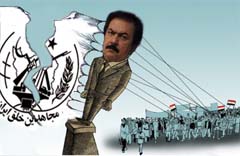 parliamentary committee on martyrs and political prisoners said that, if compelled, they would extradite MKO members to Iran.
parliamentary committee on martyrs and political prisoners said that, if compelled, they would extradite MKO members to Iran.
“The United Nations should expedite the process of their expulsion from Iraq,” Muhammad al-Hindawi said, as quoted by FNA, Habilian Association reported.
“One day we may be forced to hand the MKO elements over to the government of Iran,” he said, adding that nobody in Iraq thinks about aggression against MKO members held in the country, but they have to leave Iraqi soil.
The Iraqi MP finally concluded that the government of Iraq is not responsible for the lives of these people, as it has not granted them political asylum.
Earlier this week, the temporary home of some 3000 MKO members came under mortar attack, leaving 6 dead and dozens injured.
In an e-mail sent to news media outlets in Iraq, the military wing of Hezbollah in Iraq, claimed responsibility for the attack and warned that others would follow, NY times reported.
Head of an Iraqi human rights group says Iraq seeks to try in absentia the members of the terrorist Mujahedin-e ![]() Khalq organization (MKO, a.k.a. MEK and PMOI) in Iraq.
Khalq organization (MKO, a.k.a. MEK and PMOI) in Iraq.
“The silence of the Iraqi government, international organizations, and the mass media regarding the martyrs and victims of Munafeqin (hypocrites, a term used in Iran and Iraq for the members of MKO) grouplet made us request the hearing in the absence of the Munafeqin,” head of the Association of Justice to Defend Iraqi Victims of MKO, Dr. Nafe al-Isa, told Habilian Association in an interview on Thursday.
He said the people of Tuz Khurmato, who are victims of the MKO and the trial is going to be held in their city, expressed happiness and satisfaction over the issue.
He added that the trial will be held as coordinated with the judicial system, and the witnesses will be heard in the first session.
Dr. Nafe al-Isa also called on Iranian media to cover the sessions, the first of which will be held on February 18, 2013.
Lord Maginnis of Drumglass (Non-affiliated)
To ask Her Majesty’s Government what recent information they have concerning flooding by sewage and storm water at Camp Liberty, and whether they have made representations to the United Nations and the United 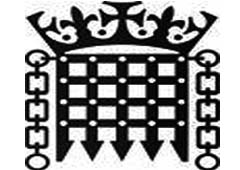 Nations Assistance Mission for Iraq about conditions at the camp.
Nations Assistance Mission for Iraq about conditions at the camp.
Baroness Warsi (Conservative)
My Lords, we are aware that parts of Camp Liberty were flooded during a recent period of heavy rainfall, as were many parts of the Baghdad area. Fortunately, this did not affect residents’ accommodation blocks. We continue to monitor the situation at Camp Ashraf and Camp Liberty through the embassy in Baghdad and to raise issues with the Government of Iraq and the United Nations.
Lord Maginnis of Drumglass (Non-affiliated)
My Lords, is it not time that the Government made a judgment, based on first-hand evidence such as that produced by the ex-UNAMI chief Tahar Boumedra, and ignored the manipulation and dissembling by Martin Kobler on behalf of the Secretary-General of the United Nations? If the United Kingdom is to maintain its integrity and influence in the Middle East, we should be pressing for the dismissal of Herr Kobler and, indeed, be asking ourselves, with our allies, whether the present Secretary-General of the United Nations has not outlived his usefulness.
Baroness Warsi (Conservative)
Before I answer the noble Lord’s very important question, I am sure the rest of the House will want to join me in wishing him a very happy birthday.
The noble Lord raises an important point. The Secretary-General, whom I met with last week at the United Nations, is doing a very important job, with the support of the international community, in some very difficult circumstances. The specific situation in relation to Camp Liberty is that the Special Representative of the Secretary-General for Iraq, as part of the United Nations Assistance Mission, regularly reports about the situation in Camp Liberty and Camp Ashraf. Our own officials visited in July last year and the international community does not, at this stage, find any credible evidence to support the matters that have been raised by Mr Tahar Boumedra.
Lord Avebury (Liberal Democrat)
My Lords, considering that many of the complaints that are made by the residents of Camp Liberty and, indeed, Camp Ashraf, against the Iraqi authorities and UNAMI could be easily verified or refuted and that some have been confirmed not only by Mr Tahar Boumedra but by the UN Working Group on Arbitrary Detention, will the Government press for an inspector to be appointed by the UN Secretary-General to look into the serious allegations of ill treatment, such as denial of access to urgently needed medical treatment, which has lead to the deaths of two inmates of Camp Liberty? Since we have been aware for some time that 52 residents of Camp Liberty were formerly refugees in the United Kingdom, will my noble friend press for their immediate transfer to the UK?
Baroness Warsi (Conservative)
As my noble friend is aware, the situation in Camp Ashraf and Camp Liberty is in many ways much better than that of residents in Baghdad. For example, electricity is available for 24 hours a day, as opposed to the three hours for which it is available in some parts of Baghdad. About 200 litres of water are available to residents there, when about 90 litres are available in some parts of Baghdad. My noble friend raises the very important issue of the recent death of a resident there. We share those concerns about the death of Behrooz Rahimian and have made inquiries specifically in relation to the medical assistance that he received. We are aware that there is a doctor and medical facilities on site 24 hours a day; there is also the opportunity to receive medical assistance from doctors in Baghdad. We understand that Mr Rahimian was afforded medical assistance in relation to his illness.
Lord Foulkes of Cumnock (Labour)
My Lords, will the Minister confirm that the new Parliament in Baghdad will be built to a British design, that UK parliamentarians, including the noble Lord, Lord Kirkwood of Kirkhope, are out there helping to develop democracy and that the development of a democratic Government in Iraq to deal with the kind of issues raised by the noble Lord, Lord Maginnis, is the number one priority and will be supported fully by the British Government?
Baroness Warsi (Conservative)
I agree with much of what the noble Lord said. He will also be aware that this situation goes back many years. The group that lives in Camp Ashraf and Camp Liberty is an organisation that originally left Iran after the Iranian revolution. Mujaheddin e Khalq, the group that is predominantly part of Camp Ashraf and Camp Liberty, has its own history and record, and we must be incredibly careful about which members of that group we readmit to the United Kingdom.
Lord Dholakia (Liberal Democrat)
My Lords, does my noble friend agree that one of the problems we have is that the United Nations has not granted Camp Liberty the status of a refugee camp? It that were granted, would it not be possible to have adequate medical facilities and for water, sewerage et cetera to be resolved? At the same time, the status of Camp Ashraf could be looked at because the property of individuals is systematically being looted there, and the information the Minister has is not the information that we receive from residents of those camps.
Baroness Warsi (Conservative)
I can assure my noble friend that about 3,000 residents of Camp Ashraf have moved to Camp Liberty. It is not a refugee camp as such; it is a place where individuals are being assessed as to the countries to which they could be relocated. Four have already come to the United Kingdom, a fifth who was offered that has decided not to come and about 52 others are being considered for coming to the United Kingdom. In relation to property at Camp Ashraf, I can assure my noble friend that about 100 residents of this group remain in Camp Ashraf specifically to sell off their property.
David Anderson (Blaydon, Labour (
(
To ask the Secretary of State for Foreign and Commonwealth Affairs what recent reports he has received on the condition of residents of Camp Ashraf and Camp Liberty; and what representations he has made to the Iraqi Government on that matter.
Alistair Burt (Parliamentary Under Secretary of State (Afghanistan/South Asia, counter terrorism/proliferation, North America, Middle East and North Africa), Foreign and Commonwealth Office; North East Bedfordshire, Conservative):
The UN visit Camp Liberty, where the majority of former residents of Camp Ashraf now live, several times a week, and report that facilities at the camp meet international humanitarian standards. For example, residents have access to electricity 24 hours a day and over 200 litres of water per person per day. This compares well to the situation for many Iraqis. I raised the situation at Camp Ashraf and Camp Liberty with the Iraqi Minister for Foreign Affairs and the Minister for Human Rights in July 2012. We continue to monitor the situation at Camps Ashraf and Liberty through our embassy in Baghdad, and to raise issues with the UN and the Government of Iraq where appropriate.
Massoud Rajavi is in danger of losing everything he ever had. The devastating significance for him of losing Camp Ashraf should not be underestimated. A 40km square piece of land  containing a nuclear bunker, arms caches, a satellite communications system, its own water and power supplies, dormitories, refectories, meeting rooms and leisure facilities, has been replaced for the residents by a 1km square area with prefab huts for living quarters. And their marching orders to leave Iraq ASAP.
containing a nuclear bunker, arms caches, a satellite communications system, its own water and power supplies, dormitories, refectories, meeting rooms and leisure facilities, has been replaced for the residents by a 1km square area with prefab huts for living quarters. And their marching orders to leave Iraq ASAP.
Worst of all is that Rajavi has lost the ability to completely isolate his people from the outside world. As hard as the MEK leaders try to keep it closed, Camp Liberty is porous to external access as Camp Ashraf never was. It is regularly visited by representatives from the UN, EU, US and various NGOs and security at the camp is taken care of by Iraq’s security forces. The Iraqi authorities have even kept open a hotel in Baghdad, hired during the transfer process, to house any residents who do not wish to live in the basic conditions of Camp Liberty.
All this has made it possible for people to leave the MEK. It is a slow and difficult process of attrition because the cult maintains an iron grip on the residents through its psychologically coercive, high-pressure indoctrination process which is characterised by a daily confession and punishment regime for every single person from rank and file to leadership. The danger that is absolutely paramount in Rajavi’s mind is that sooner or later the cult will be dismantled, its membership dispersed and he will be left alone.
It is in this context that the controversial US Library of Congress report which asserts that Iran’s Intelligence agency has 30,000 employees should be placed for meaningful analysis and assessment.
The leaked report has been quickly and decisively exposed as a sham. And it should be clear to careful readers that the (privately commissioned and paid) report hasn’t been written for the MEK but has been written by the MEK; it contains much MEK cult jargon and many second language-user errors. Beyond this, the sources for much of the content can be traced directly to MEK websites which are, unsurprisingly, no longer functioning.
Why would the MEK risk publicising this easily refuted piece of nonsense?
Educated observation of its behaviours and statements will reveal that the MEK is not an actual player in the political scene, and that much of what the cult does publicly is really designed for internal consumption rather than as part of a policy platform to confront Iran. (Anyone who has direct dealings with MEK members will know that expecting transparency or consistency from them is like asking a drunk to walk in a straight line.
By commissioning this report Rajavi has created a fraudulent narrative with which to deceive his followers. His intention is to persuade as many as possible to remain in Camp Liberty, rather than be transferred to third countries by the UNHCR, by giving them false hope and expectations for the future of the MEK.
What Rajavi is saying through this report is that in spite of being incarcerated in Camp Ashraf and then Camp Liberty for ten years doing nothing, the MEK is in fact engaged in a serious head to head fight with the Islamic Republic of Iran in the shape of the Khodabandeh family. The Khodabandehs are libellously depicted in the report as “agents of Iran’s Ministry of Intelligence”. According to Rajavi’s narrative the Khodabandehs are at the forefront of a massive spy network spread throughout the world and tasked to destroy the MEK. He has chosen to ‘promote’ the Khodabandeh family to this position because they are the most prolific and effective English language critics of his cult. He can motivate the residents of Camp Liberty to stay on in order to fight this enemy.
Rajavi has bigged up the Khodabandeh family and the hundreds of former MEK members who are vociferous in their criticisms because he is being defeated by their exposures. He has created the excuse that they are the face of the Iranian regime and extremely powerful and that is why it is so difficult to defeat them. (Interestingly only days ago Rajavi told the residents inside the camp that if they hear anything bad about him -he means the allegations of sexual abuse against women members -they should ignore such talk. Their only task is to accept his leadership and be confident that, in good time, he will answer his enemies. In other words he is instructing the MEK not to think, only to unquestioningly obey.)
But Rajavi’s deceptive narrative continues: do not be concerned about this fight with the regime, do not run away from it, because the MEK has the backing of the most powerful people in the American political establishment, the Israeli lobby and the Neoconservatives. Rajavi promised that the report would receive massive coverage in the American media and be supported at the highest levels in the American establishment as evidence that the only way to confront Iran is military action; that is, war.
His intention is to convince the MEK that he has found a replacement for Saddam’s regime in the Israeli lobby and Neoconservatives in Europe and the US. (In other times he has been prepared to fake mercenary status for the MEK to imply such support.)
The problem for Rajavi is that this didn’t happen. The report was leaked to the press as planned, but there was no media fest. Instead the report was pulled back "for revision" when the Library of Congress realised the shoddy piece of work was ripe for investigation: how was it possible for a group like the MEK to infiltrate its disinformation into the ‘Irregular Warfare Support’ office of the Combating Terrorism Technical Support Office in the Pentagon? The investigation has even gone as far as Brussels where Members of the European Parliament are now being questioned about their use of this unpublished, un-attributed report to interfere in the asylum process for Iranian refugees.
Rajavi has exposed his weakness not only in Iraq where the residents of Camp Liberty are drifting away from his control, but in the heart of Washington. Exposure of the lies and distortions in the report mean that Rajavi is not being protected and promoted as he has said by powerful people in the capital. Not only that, the defeat he is facing really is at the hands of former members and not the powerful Iranian Ministry of Intelligence.
Perhaps now a line can be drawn under this issue and the focus of attention placed back where it belongs; Camp Liberty and the 3000+ cult hostages – and their families – whose future still remains uncertain.
Anne Khodabandeh (Singleton), Middle East Strategy Consultants
A US Library of Congress report asserting that Iran’s Intelligence agency has 30,000 employees has been widely quoted – and criticized. The report has been withdrawn and is now under 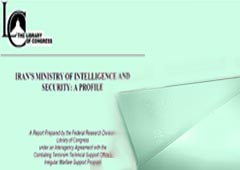 revision.
revision.
An official with the Library of Congress says a widely cited but poorly sourced report his office did on Iran’s intelligence ministry has been pulled from circulation.
As we detailed last week, the study’s ill-supported claim that the Iranian intelligence ministry has 30,000 employees was picked up by CNN and others. News outlets have also seized on other assertions in the report.
The report, which was produced on behalf of a Pentagon office, had been posted on a non-public government-only website. It was leaked earlier this month.
"The report was pulled for revisions after the Division staff identified a passage that should have been caveated but was missed in the initial reviews," said Federal Research Division chief David Osborne in an email. "The report will be re-posted when revised."
Osborne declined to specify the passage in question. It might have had nothing to do with the 30,000 figure.
Another section of the report prompted a married couple branded as spies for Iran to consider legal action.
The report flatly claims that a British woman and her Iranian-born husband are operatives for Iran’s intelligence ministry. The husband, Massoud Khodabandeh, is a former-member-turned-fierce-critic of the Mujahadin-e Khalq (MEK), a small exile group that has long fought the government of Iran and was recently removed from the U.S. government’s list of terrorist organizations.
The report even includes their pictures.
The report’s source for the spy claim is a 2007 essay published on a now-defunct website by Rabbi Daniel Zucker, who is chair of a group called Americans for Democracy in the Middle East and has frequently written in support of the MEK.
The Zucker piece in turn cites a 2005 post on another now-defunct pro-MEK website called iranterror.com. That site also states Khodabandeh and his wife are operatives for Iranian intelligence, but does not offer any sources or evidence.
Even though it relied on questionable sourcing, the report effectively extended the imprimatur of the U.S. government to the claim that the couple are spies.
Asked about the various criticisms of the report, Pentagon spokeswoman Anne Edgecomb told ProPublica: "We believe its findings will enrich the discussions and concepts of policy makers."
She declined to comment further.
The MEK’s official website seized on the government report this month, publishing an item claiming that "a recent investigative report by [the] Pentagon … revealed that Anne and Massoud Khodabandeh are agents of the mullahs’ Ministry of Intelligence and Security."
Khodabandeh and his wife, Anne, who also worked with the MEK in the 1980s and 90s, were incensed by the government report.
"Everything they’ve said is just made up," Anne Khodabandeh told ProPublica.
Massoud Khodabandeh wrote a response column on Huffington Post blasting the report for its reliance on pro-MEK sources. The couple, who are based in the United Kingdom, run an anti-MEK website and consider the group a dangerous cult. (That charge that has been echoed by some outside observers but rejected by the MEK.)
The study claims that after Khodabandeh left the MEK in 1996, he and Anne "agreed to work for [Iran’s intelligence ministry] and spy on MEK." It claims that the intelligence ministry used threats against Khodabandeh’s family in Tehran to compel the couple to cooperate.
Earlier this month, Anne Khodabandeh emailed Osborne, the Federal Research Division chief, saying that "my solicitor would like to know the actual provenance of the report for further action." Osborne responded that the report had been pulled down for (again unspecified) revisions.
"The fact that the document was leaked to [Washington Free Beacon reporter] Mr. Bill Gertz or otherwise publicized is not the fault of the Library of Congress," Osborne wrote Jan. 9. "It is not and will not be posted to any Library of Congress site."
Anne Khodabandeh told ProPublica she and her husband are holding off on legal action at this point because of the potential expense involved, and the fact that the report does not name its author.
Justin Elliott,
The Library of Congress has pulled a report on Iran’s intelligence activities from circulation after an American journalism watchdog showed that the widely cited text was playing fast and loose with the facts.
American and international media outlets had jumped in the report’s claim that Iranian intelligence was employing 30,000 people, a figure called "ill-supported" by ProPublica, a New York-based non-profit reporting on public interest matters.
The report had been produced by a Pentagon office and posted to a US government intranet site before leaking to the public in early January.
And a massive Iranian intel staff wasn’t the only dubious claim brought to light by ProPobulica: the report also alleged, without much evidence, that Vienna was the European hub for the Iranian foreign spy network and that Tehran was gathering information by way of "signals intelligence stations" throughout the Middle East, with many of them in Syria.
"The report was pulled for revisions after the Division staff identified a passage that should have been caveated but was missed in the initial reviews," Federal Research Division chief David Osborne told ProPublica in an email.
Though the document was taken offline "for revisions," it has not gone back up in a modified form.
It was also the source of public humiliation in the UK after claiming explicitly that Briton Anne Khodabandeh (nee Singleton) and her Iranian-born husband Massoud were Iranian foreign intelligence operatives, even showing their pictures. Khodabandeh, a former member of the MEK, the exiled group fighting the Iranian government, has in recent years become a critic of the group, which was recently taken off the US government’s list of terrorist organizations.
To back up its claim that Khodabandeh was spying for Tehran, the report cited a 2007 essay written by Rabbi Daniel Zucker, who chairs a group called Americans for Democracy in the Middle East and is known to write often in support of the MEK. The website where his essay was published is no longer operational, but had linked to the also now-defunct iranterror.com as its source.
After seeing the report, even the MEK claimed that the Pentagon’s report showed that "Anne and Massoud Khodabandeh are agents of the mullahs’ Ministry of Intelligence and Security."
"Everything they’ve said is just made up," Anne Khodabandeh told ProPublica.
Despite such sketchy sources, the report was for all intents and purposes the official word of the United States government.
The Khodabandehs are refraining from legal action due to the costs of such a lawsuit and the fact that report does not credit an author.

